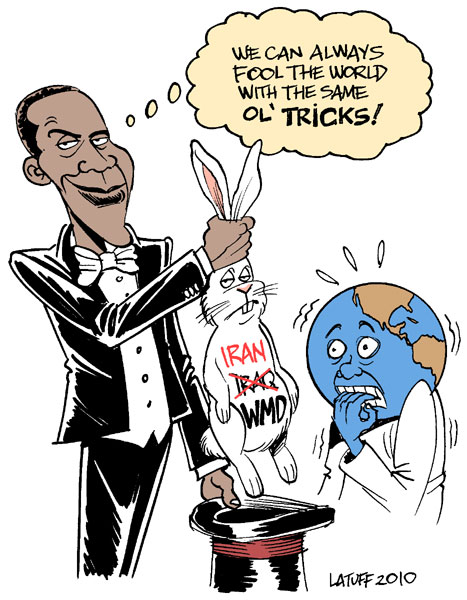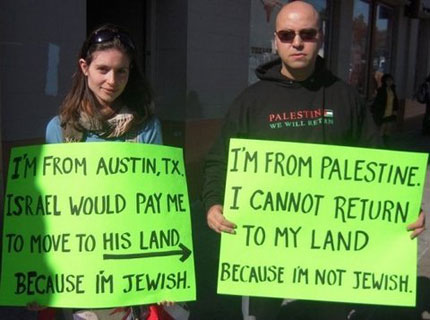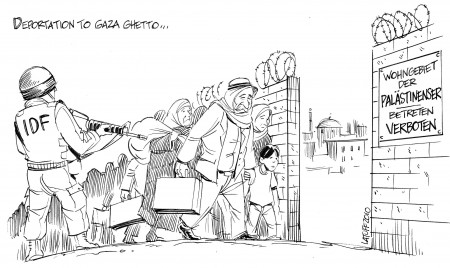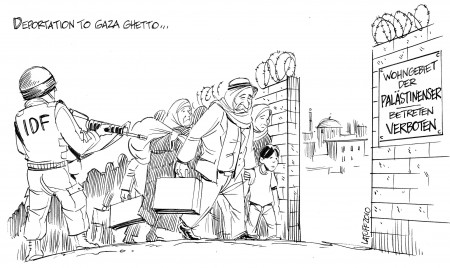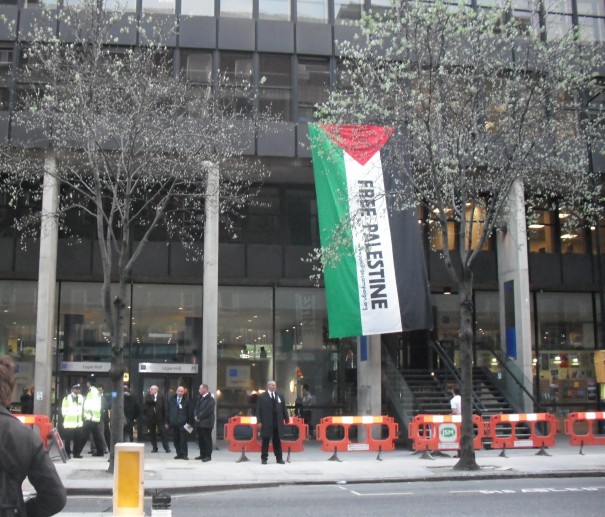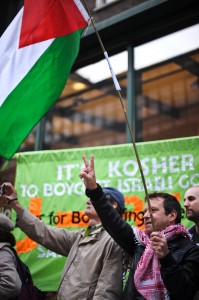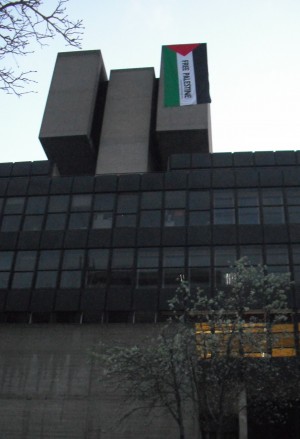Nasrallah: Israel should be wary of war against Lebanon: Haaretz
Israel would be taking a big risk if it decided to open war on Lebanon or on any of the other countries in the Middle East, Hezbollah chief Sheikh Hassan Nasrallah said Thursday, advising Israeli politicians and generals to stay cautious regarding such a possibility.
Speaking to a Kuwait-based news channel, Nasrallah, referring to recent tensions between Israel and its neighbors to the north, said that “any war started by Israel against Lebanon or anywhere in the region would be taking a very dangerous risk on its part.”
“That kind of war would change every parameter in the Middle East,” the Hezbollah chief said, adding that his organization was not “frightened by the threat or by Israel’s psychological warfare.”
Advertisement
The Hezbollah added that he knew that “Israeli politicians and generals, past and present, are very worried and very cautious and we would like them to stay that way,” saying that “the blood of Imad Mughniyeh would haunt them everywhere.”
The militant organization has vowed vengeance against Israel ever since Mughniyeh’s 2008 assassination, which it blames on Israel.
“I cannot say that it is close. Myself and brothers in Hezbollah see that all this intimidation does not hide behind it a war. On the contrary, if there was silence and quietness, then everyone must be vigilant,” Nasrallah said.
“But when you see all this American and Israeli noise, this means they want to use this noise to achieve political, psychological and certain security advantages without resorting to the step of war,” Nasrallah added.
Referring to an alleged long-range surface-to-surface- missile deal, reported by Israel to have taken place between Syria and Hezbollah, Nasrallah said that the “Israeli allegations on the transfer of Scud missiles from Syria to Hezbollah, in spite of Syrian denials and the quiet from the organization only strengthens Lebanon’s confidence in itself and in the ability of the resistance to defend Lebanon.”
“My comments from a month ago speaking of how we will reach anywhere in Israel are supported in the eyes of the Lebanese and Arab peoples when Israel and the United States discuss the transfer of Scud missiles from Syria to Hezbollah,” Nasrallah said.
On whether such a deal took place, the Hezbollah leader said: “Today it’s Scuds, yesterday other kinds of rockets … the aim is one, and that is to intimidate Lebanon, to intimidate Syria and to put pressure on Lebanon, Syria, the resistance movement and the Lebanese and Syrian people,” Nasrallah said.
“Regardless of whether Syria gave Hezbollah this type of rockets … of course Syria denied, and Hezbollah as usual does not comment.
Four Palestinians die in Gaza-Egypt ‘tunnel collapse’: BBC
The tunnels provide a lifeline for those living in the impoverished Gaza Strip
Four Palestinians have died in a smuggling tunnel under Egypt’s border with the Gaza Strip, Palestinian medical officials say.
The men died because of an explosion near the Egyptian side, the head of emergency services in Gaza said.
Some Gazans accuse Egypt of using dynamite and pumping gas into the tunnels to end Palestinian attempts to beat the Israeli-Egyptian blockade.
However, flammable items such as petrol are frequently transported underground.
Hamas, the Islamist movement that controls Gaza, accused Egypt of “spraying poison gas” into the tunnel.
Egyptian security officials have denied the allegation they used poison gas.
An unnamed security source told the Associated Press that Egypt routinely blows up the mouths to the tunnels to seal them off, and that the blast and an ensuing fire could quickly use up all the oxygen in the confined space causing people caught inside to suffocate.
French news agency AFP quoted unnamed officials as saying Egyptian security forces had destroyed four tunnels but were unaware of any casualties.
Egypt is building a huge underground barrier along the Gaza border to stop smuggling.
The structure – made of bomb-proof steel – will be 10-11km (6-7 miles) long and extend 18m (59ft) below the surface.
Under the blockade, Israel allows only limited humanitarian goods into the strip, saying it wants to pressure Hamas and stop it smuggling in weapons, including the some of the rockets that Gaza militants fire into southern Israel.
The tunnels are used to smuggle in arms, fuel and goods from Egypt, but cave-ins are frequent.
Egypt keeps its pedestrian border crossing with the Gaza Strip closed most of the time.
In a separate incident, a Palestinian man died after being shot during a protest near Gaza’s border with Israel.
Palestinian medics said Ahmed Salim, 20, died after being shot by Israeli forces in the thigh.
The Israeli military said live rounds were fired as “warning shots” in response to a “riot”, where about 50 Palestinians were throwing stones and starting fires.
It said the incident had taken place 50m from the border fence with Israel, but that it considers the area 300m from the fence to be a “combat zone”.
Adie Mormech, an activist with the International Solidarity Movement group, said that although stones were being thrown, none reached the fence, and there was no warning fire before the shot that hit Mr Salim.
Palestinian and international demonstrators have increased protest activity in the buffer zone in recent months. Israel maintains a policy of firing at anyone present in the area.
Israel says the zone is necessary for security, as militants frequently approach the fence to try to plant explosives and attack Israeli forces.
But Palestinians complain that the buffer zone renders swathes of agricultural land unusable.
Lieberman: Proximity talks to resume in 2 weeks: Haaretz Service
Proximity talks, geared at renewing negotiations toward a peace agreement between Israel and the Palestinians, are expected to launch within two weeks, Army Radio quoted Foreign Minister Avigdor Lieberman as saying on Thursday.
Speaking to reporters, Lieberman added, however, that he was skeptical of the Palestinians’ willingness to engage in peace talks, saying it was “unreasonable” to talk peace while perpetuating terror through naming squares after blood-thirsty terrorists.
Earlier Thursday, Vice Prime Minister Silvan Shalom also voiced his belief that Israel and the Palestinians were nearing renewed negotiations, saying he felt “it was time to stop letting the United States doing the Palestinians’ work for them.”
Advertisement
“It’s time that [Palestinian Authority President Mahmoud Abbas] decides to sit with Israel and conduct real negotiations,” Shalom said, adding that “Jerusalem is out of any talks and is Israel’s eternal capital.”
Referring to the possibly of a flare up between Israel and Lebanon, Lieberman told reporters Thursday that Israel would not attack its neighbor to the north despite recent reports alleging that Hezbollah had received long-range Scud surface-to-surface missiles from Syria.
“Israel has no intention to create a provocation or engage in irrational acts,” Lieberman said
One Laptop Per Child reaches Gaza Strip: BBC
The laptops are designed for use by children in the developing world
The UN in the Gaza Strip has begun distributing thousands of laptop computers to children in its schools.
The rugged laptops are made by the non-profit organisation One Laptop Per Child, which aims to give a computer to every child in the developing world.
One Laptop Per Child say computers are a good way of improving the education of children living in poverty.
Humanitarian conditions have deteriorated in the Gaza Strip in the last three years, the UN says.
Israel and Egypt maintain a blockade on Gaza, which was tightened in 2007 after Hamas took control of the Gaza Strip, and all but humanitarian supplies are prevented from entering.
Unrwa, the UN agency for refugees, began distributing 2,100 laptops on Thursday in Rafah, a town in the south of the strip.
This is part of a wider ambitions to distribute 500,000 laptops to children in Gaza by 2012.
Connected
One Laptop Per Child has built the energy efficient XO laptop especially for children in developing countries.
“The XO laptop has a special place in children’s education in regions that are disrupted by ongoing violence,” said Nicholas Negroponte, founder of the organisation.
“With the XO the children can continue to stay connected and gain the skills and knowledge required to participate fully and thrive in the 21st century – even when getting to school is impossible.”
The UN agency which looks after Palestinian refugees, UN Relief and Works Agency (UNRWA) provides housing, health services, education and emergency food supplies to more than four million refugees in five countries.
The computers are to be loaded with textbooks and teaching aids that cover the primary school curriculum, a statement from UNWRA said.
EDITOR: New Recruit for the One-State Solution
A rather unexpected recruit to the camp of the One-State argument… but an interesting admission that the Two-state solution requires to relinquish the Occupied Territories of Palestine!
Israel official: Accepting Palestinians into Israel better than two states: Haaretz
Knesset Speaker Reuven Rivlin said Thursday that he would rather accept Palestinians as Israeli citizens than divide Israel and the West Bank in a future two-state peace solution.
Speaking during a meeting with Greece’s ambassador to Israel Kyriakos Loukakis, Rivlin said that he did not see any point of Israel signing a peace agreement with the Palestinian Authority as he did not believe PA President Mahmoud Abbas “could deliver the goods.”
Referring to the possibility that such an agreement could be reached, Rivlin said: “I would rather Palestinians as citizens of this country over dividing the land up.”
Late last year, Rivlin said in a Jerusalem address that Israel’s Arab population was “an inseparable part of this country. It is a group with a highly defined shared national identity, and which will forever be, as a collective, an important and integral part of Israeli society.”
In a speech given in the president’s residence, the Knesset speaker called for a fundamental change in relations between Jews and Arabs in Israel, urging the foundation of a “true partnership” between the two sectors, based on mutual respect, absolute equality and the addressing of “the special needs and unique character of each of the sides.”
Rivlin also said that “the establishment of Israel was accompanied by much pain and suffering and a real trauma for the Palestinians,” adding that “many of Israel’s Arabs, which see themselves as part of the Palestinian population, feel the pain of their brothers across the green line – a pain they feel the state of Israel is responsible for.”
“Many of them,” Rivlin says, “encounter racism and arrogance from Israel’s Jews; the inequality in the allocation of state funds also does not contribute to any extra love.”
EDITOR: The New Antisemitism
In the age-old antisemitic tradition, the settlers are out on a pogrom against Palestinians every time they feel tetchy. No one seems to be able or willing to stop them, of course, and no one is ever prosecuted for the hundreds of local pogroms against Palestinian villages and towns. The only Jewish Democracy is only democratic for Jews, of course.
Israeli border police unit to tackle settler violence: BBC
Cars have been burned and a mosque vandalised in the north West Bank
Israel’s border police are to post a special task force in the northern West Bank to stop settler violence against Palestinians, the military says.
It said the decision followed what the military dubbed a “riot” by settlers in the area last week.
The force was to prevent “retributional violence” by settlers against Palestinians and to prevent damage to property, the military said.
Palestinians mosques, cars and trees were recently attacked in the area.
The decision to deploy the new task force “was made due to violent confrontations during Independence Day,” the Israeli military said.
Last Tuesday, the military called “intolerable” an incident in which it said about 100 settlers threw rocks and attacked soldiers as they tried to stop the settlers entering a Palestinian village.
One soldier was injured in the face by a thrown bottle.
Residents of the nearby settlement of Yitzhar were quoted by Israeli media as saying the soldiers harassed them as they tried to visit the area.
The previous week a mosque was vandalised with Jewish grafitti, cars were burned and olive trees uprooted in the village of Hawarra, also near Yitzhar settlement.
Some hard-line settlers advocate a “price tag” policy under which they attack Palestinians in retaliation for any Israeli government measure they see as threatening Jewish settlements.
Prime Minister Benjamin Netanyahu’s decision to limit building in the settlements for 10-months to help restart peace talks with the Palestinians has angered many in the settler movement.
Jewish settlements in the West Bank, including East Jerusalem, are illegal under international law, though Israel disputes this.
Israel has occupied the West Bank, including East Jerusalem, since 1967, settling close to 500,000 Jews in more than 100 settlements.
There are about 2.5 million Palestinians living in the West Bank.
Israel’s military has dubbed as “intolerable” what it described as a “riot” by settlers in the West Bank.
The military said about 100 settlers threw rocks and attacked soldiers as they tried to stop the settlers entering a Palestinian village.
One soldier was injured in the face by a thrown bottle.
Residents of the settlement of Yitzhar were quoted by Israeli media as saying the soldiers harrassed them as they tried to visit the area.
Israeli citizens from the area of Yitzhar tried to enter the nearby village of Madma in the northern West Bank on Tuesday evening, the military said in a statement.
Soldiers tried to set up a military zone, but more settlers arrived and pelted them with rocks, it said.
“Violence and raising hands up against IDF [Israeli Defence Forces] soldiers is crossing the line in an intolerable manner,” the statement said.
The incident occurred on Israel’s independence day, which the military said made it “all the more serious”.
Settlers quoted by the Israeli newspaper Haaretz said the military had been trying to prevent them from hiking in the area all day, and that a soldier had fired in the air during the confrontation – a charge the military denied.
‘Spate of attacks’
Last week a mosque was vandalised with Jewish grafitti, cars were burned and olive trees uprooted in the village of Hawarra, also near Yitzhar settlement.
Chief Palestinian negotiator Saeb Erekat condemned what he described as a recent spate of attacks on Palestinian property by settlers.
He said Israeli state policy had given rise to “a culture of violence, hatred and extremism in which Israeli settlers, often accompanied by Israeli soldiers, run riot across the West Bank”.
Israeli rights groups say the military often does not do enough to prevent attacks on Palestinians and their property.
Some hard-line settlers advocate a “price tag” policy under which they attack Palestinians in retaliation for any Israeli government measure they see as threatening Jewish settlements.
Prime Minister Benjamin Netanyahu’s decision to limit building in the settlements for 10-months to help restart peace talks with the Palestinians has angered many in the settler movement.
Jewish settlements in the West Bank, including East Jerusalem, are illegal under international law, though Israel disputes this.
Israel has occupied the West Bank, including East Jerusalem, since 1967, settling close to 500,000 Jews in more than 100 settlements.
There are about 2.5 million Palestinians living in the West Bank.
